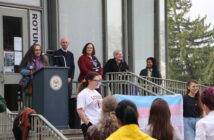Last month, the Intergovernmental Panel on Climate Change released its 2023 summary report, a culmination of the last seven years of research from across the globe on the cutting edge of climate science.
The report, like the ones before it, highlighted increasingly alarming prospects for a warming future and warned policymakers and the private sector about actions they must take immediately to mitigate the worst effects of a hotter planet.
There are so many angles we could take in discussing the implications of this report:
What responsibilities do carbon emitters in the West have to a Global South that will inevitably feel the worst effects of climate change despite doing little to cause it? How do we manage to get policymakers to stop dragging their feet on substantive climate policy? How much of an impact does corporate greed and unfettered capitalism have on the implementation of solutions?
These questions — and so many more — must be addressed now to subvert a disastrous future. Still, we feel our limited influence would be better directed at examining where Lehigh fits into the equation.
Are we part of the problem or part of the solution?
Lehigh’s Office of Sustainability emphasizes its Sustainability Strategic Plan 2030, a long-term plan to establish a vision for sustainability at Lehigh. While we are happy to see a detailed plan for a sustainable university, it’s hard to tell how many of the provisions touted by the office have made and will make a significant enough difference.
In January, the office released the Sustainability Strategic Plan’s 2022 progress report. The 43-page slideshow appears to show steady progress, but many of the report’s goals are profoundly underwhelming.
A majority of the goals that have been achieved consist of creating additional plans, joining committees, making pledges or adding words of support to administrative documents. The ambitious goals contained in the plan, such as offsetting all carbon emissions with renewable resources or creating a fully-electric fleet of university transportation, have been delayed or put on hold due to a lack of funding.
We don’t doubt the sustainability office and its members are committed to the cause of sustainability and are doing what they can to expedite the process, but it is hard not to wonder whether the university administration beyond that office cares more about sustainability or the PR boost that comes along with sustainable planning.
“Greenwashing” is a term that has gained popularity in sustainable circles in recent years. It signifies a company that markets itself as sustainable while not actually doing much to warrant that label.
For example, Ziploc has been running a line of biodegradable bags for the last decade. This step seems significant in the context of an advertisement, but if they truly cared about climate over profit, all their bags would be biodegradable.
We hesitate to label Lehigh as such. We do not know the extent of its efforts to create a sustainable campus, and it is not unlikely that we are too cynical to appreciate the steps the university is taking with programs like the Sustainability Strategic Plan.
Still, when you read what the Intergovernmental Panel has to say, it’s hard not to be cynical.
Where responsibility falls: student or university?
Another aspect of Lehigh’s sustainable efforts deserving of a critical eye is its tendency to shift the responsibility of sustainability from the university itself onto students.
We see this in many of the initial goals the Sustainability Strategic Plan completed shortly after its implementation.
These early goals include the creation of a bi-yearly Sustainability Literacy Assessment targeting the student body, faculty orientations focused on sustainability-focused curriculum integration and the creation of the Campus Sustainable Impact Fellowship.
The fellowship is a research program where students create and implement their own programs to foster a more knowledgeable and eco-friendly campus — if you have ever been on the fifth floor of Fairchild-Martindale Library and noticed rolling carts filled with plants, you’ve seen the impact of this program.
We do not deny these programs are all good things, and we are happy to see students are jumping at the opportunity to get involved in them, but putting the pressure of making Lehigh sustainable on students does not seem very fair.
No matter how much we recycle or we examine our own carbon footprints, these efforts are not going to save the world.
And while Lehigh itself, for all its resources and funding, may not be able to put a dent in the climate crisis either, building a solar farm on Goodman campus (something the Sustainability Strategic Plan has listed as a goal but has delayed due to funding concerns) would offset a lot more carbon emissions and do more in the context of the university than any of us could do on our own.
We apologize if this piece comes off as apathetic or nihilistic, but it is discouraging to read about how dire our situation is becoming while simultaneously feeling as though the ones with the power to make change are wasting time and shifting blame.
Well, we’re off to sort our recycling. Let’s falsely hope that’s enough.






Comment policy
Comments posted to The Brown and White website are reviewed by a moderator before being approved. Incendiary speech or harassing language, including comments targeted at individuals, may be deemed unacceptable and not published. Spam and other soliciting will also be declined.
The Brown and White also reserves the right to not publish entirely anonymous comments.